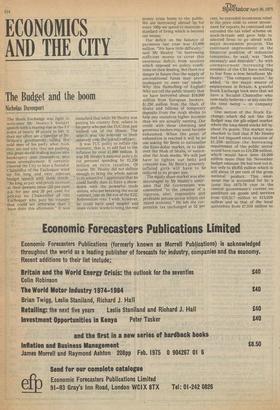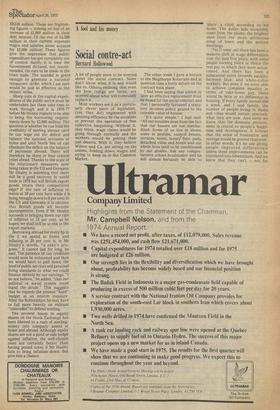ECONOMICS AND THE CITY
The Budget and the boom
Nicholas Davenport
The Stock Exchange was right to welcome Mr Healey's budget speech with a roaring rise in the FT index of nearly 40 points to 340. It does not often see a member of Mr Wilson's government telling the wild men of his party what fools they are and why they are pushing this great world-trading nation into bankruptcy and themselves into mass unemployment. It certainly cheered the City to hear a Socialist Chancellor of the Exchequer wind up his long and very relevant budget speech with these words: "So long as pay and prices increase at their present rates (32 per cent p.a. for pay and 20 per cent for prices) no Chancellor of the Exchequer who puts his country first could act otherwise than I, have done this afternoon." It was remarked that while Mr Healey was putting his country first, others in his party who put the TUC first just walked out of the House. The speech was too relevant to their apostasy over the Social contract. It was TUC policy to reflate the economy, that is, to add fuel to the inflation by over £1,000 million. It was Mr Healey's national policylo cut personel spending by £1,250 million on extra taxation. Of course, Mr. Healey did not deflate enough to bring the whole nation to its senses but I appreciate that he could hardly dare to force a showdown with the powerful trade unions, who are breaking the social contract, just on the eve of the EEC Referendum vote. I wish, however, he could have used simpler and more violent words to bring the real money crisis home to the public. We are borrowing abroad 5p for every 100p we spend to maintain a standard of living which is beyond our means.
Our deficit on the balance of payments last year was £3,800 million, "We have little difficulty," said Mr Healey "in borrowing sufficient money to cover this enormous deficit from sources which imposed no policy conditions on their lending. But there is a danger in future that the supply of unconditional funds may prove inadequate to meet our needs." Why this flannelling of English? Why not tell the public bluntly that we have borrowed about $10,000 million from European bankers, $1,250 million from the Shah of Shahs and billions of temporary deposits from the Arab sheiks to help pay ourselves higher incomes than we are actually earning. Our credit with these charming and generous lenders may soon become exhausted. When the point of exhaustion is reached it will be no use asking Mr Benn to nationalise the Euro-dollar market, or to take over the Shah of Shahs, or nationalise the Arab sheiks. We will just have to tighten our belts and consume less. Mr Benn's presently inflated girth will have to be reduced to its proper size.
The equity share market was also encouraged by Mr Healey's assurance that the Government was committed "to the creation of a vigorous, alert, responsible and profitable private sector within our mixed economy." He left the corporation tax unchanged at 52 per cent, he extended investment relief in the price code to cover investment for exports, he continued and extended the tax relief scheme on stock-in-trade and gave help to selected firms to go ahead with major investment projects. The continued improvement in the financial position of industrial companies, he said, was "both necessary and desirable". So with unemployment increasing the members of the CBI have nothing to fear from a now beneficent Mr Healey. "The company sector," he added, "is the major source of employment in Britain. A grateful Stock Exchange took note that we have a Socialist Chancellor who now really believes — at any rate for the time being — in company profits.
One section of the Stock Exchange which did not like the Budget was the gilt-edged market where the long-dated stocks fell by about 11/2 points. This market was shocked to find that if Mr Healey had not imposed extra taxation of £1,250 million the borrowing requirement of the public sector would have risen to £10,256 million, which would have been £4,000 million more than his November budget estimate. He has now cut it, but only to £9,055 million which is still about 10 per cent of the gross national product. This enormous rise is accounted for by a jump this 1975-76 year in the central government's current expenditure on goods and services from £10,517 Million to £13,029 million and in that of the local authorities from £7,310 million to £9,338 million. These are frightening figures — coming on top of an increase of £1,000 million in their debt interest. Of the rise of £4,500 million in their current expenses wages and salaries alone account for £3,000 million! These figures give the impression that public expenditure has got completely out of control. Surely it is time the Government dictated, not recommended, the cuts to be made in the town halls. The scandal is grave enough to generate a national ratepayers' strike, which I am sure would be just as effective as the miners' strike.
Sharp cuts in the capital expenditures of the public sector must be undertaken but these take time to work through and it is 1976-77 before Mr Healey expects to be able to bring the borrowing requirements down by £3,000 million. The question is whether he can hold the credibility of sterling abroad until he can wipe out the deficit and balance the national accounts at home and until North Sea oil can eliminate the deficit on the balance of payments abroad. There will therefore be three or four critical years ahead. Thanks to the scale of the relationary measures now being taken in the US and Germany Mr Healey is assuming that there Will be a good recovery in world trade in 1976 but will British export goods retain their competitive edge? If the rate of inflation remains at 20 per cent here while it is being brought down to 6 per cent in the US and Germany it is obvious that British goods wIl become uncompetitive. Even if Mr Healey succeeds in bringing down our rate of inflation to 12 per cent, as he hopes, we shall still be at risk in the export markets.
Borrowing abroad for every 5p in the £ we spend at home and inflating at 20 per cent is, in Mr Healey's words, "a rake's progress.” It cannot last for long, he said. The patience of our creditors would soon be exhausted and then we would have to pull down the level of public services and personal living standards to what we could finance entirely by our earnings. "I do not believe," he added, "that our political or social system could stand the strain." This suggests that he regards the present "hard" budget as an interim measure. After the Referendum he may have to fall more heavily on militant "comrades" to defend sterling.
The present boom in equity shares on the Stock Exchange has been likened to a rush of sterlingmoney into company assets at home and abroad. Although equity shares are not a good or safe hedge against inflation, the well-chosen ones are certainly better than having pound notes if Mr Healey fails to bring inflation down. But give him a chance.











































 Previous page
Previous page